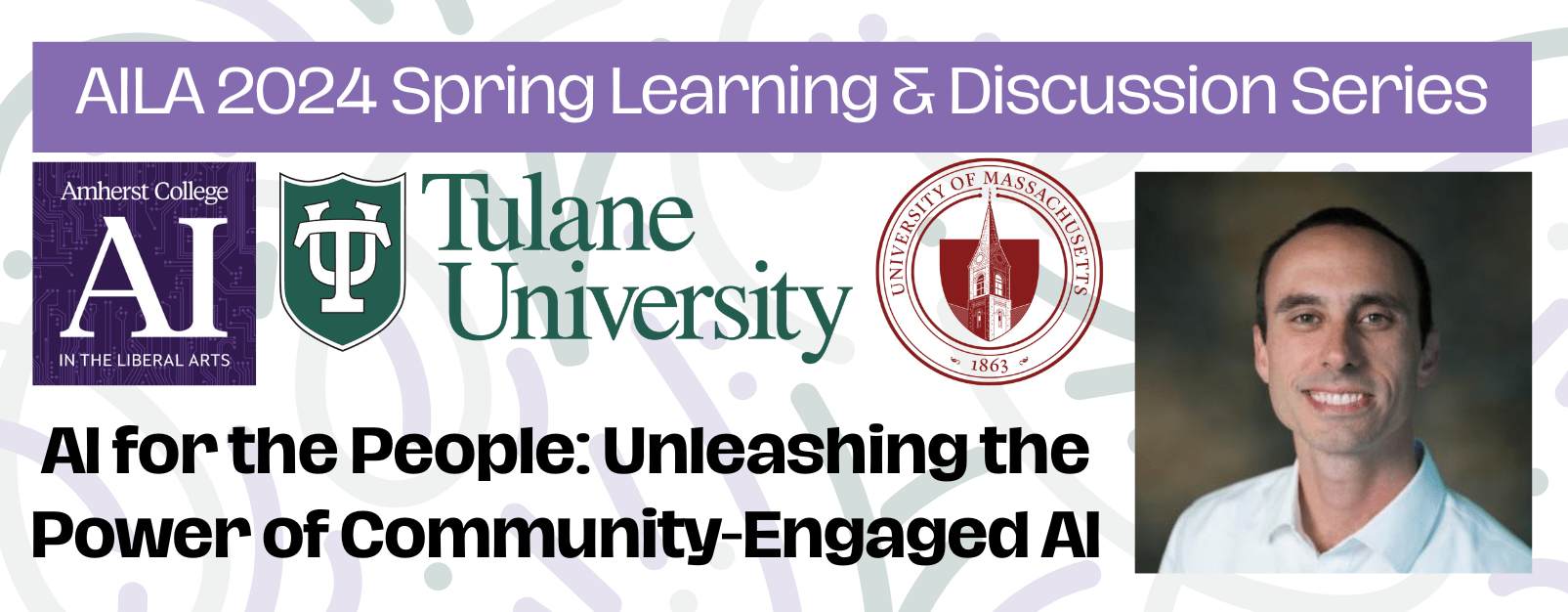A Conversation with Aron Culotta (Tulane University’s Center for Community-Engaged AI), Dan Cannity (UMass- IDEAS), and Kirsten Helmer (UMass- CTL) | April 4th @ 4p ET | Zoom
Register Here!
Many technologists argue that artificial intelligence holds the promise of significantly enhancing a variety of societal institutions like healthcare, education, and public safety. However, its potential for harm is argued by some to be equally significant, particularly in critical areas like employment and criminal justice, where the consequences of incorrect decisions can be profound.
Since April 2023, a group of faculty at Tulane University in New Orleans, LA have developed some innovative approaches to ensure the latest advancements in AI are working for the community, rather than against it. In this virtual event, part of AILA’s 2024 Spring Learning & Discussion Series, we welcome Aron Culotta, Director of Tulane’s Center for Community-Engaged Artificial Intelligence (and UMass-Amherst alum) to share his on-going work with several community organizations in New Orleans using the tools and resources they have to work towards justice in the city.
Dr. Culotta will share his work and engage in discussion with Kirsten Helmer, of UMass’s Center for Teaching and Learning, and Dan Cannity of Instructional Design, Engagement, and Support (IDEAS) about how faculty in Higher Education can leverage AI to enhance community-engaged learning and develop students’ critical thinking, ethical reasoning, creativity, and innovative problem-solving skills. Kirsten and Dan have been leading UMass Amherst’s ChatGPT and Generative AI Discussion Group: Navigating the Future of Teaching and Learning that has been meeting monthly since Fall 2023.
This event is open to anyone interested in learning more about how AI tools can be applied to community challenges. We welcome faculty, staff, and students from the Five Colleges and Tulane communities as well!

About the panelists:
Aron Culotta is an Associate Professor of Computer Science at Tulane University. His research investigates computational methods to learn about human behavior from online social networks, combining machine learning, natural language processing, and social network analysis. Examples include tracking diseases, measuring effectiveness of public health campaigns, informing crisis response, preventing online harassment, detecting deceptive marketing, and identifying unsafe products. He obtained his Ph.D. in Computer Science from the University of Massachusetts, Amherst in 2008, was a Microsoft Live Labs Fellow, a Nayar Prize Finalist, and recipient of best paper awards at AAAI and CSCW. His interdisciplinary research is supported by several NSF-funded collaborations with researchers in public health, political science, marketing, and emergency management.
Kirsten Helmer serves as the organizational lead for the TIDE (Teaching for Inclusiveness, Diversity, & Equity) Ambassadors Fellowship and the Manning Prize for Excellence in Teaching; leads workshops, develops resources, and works with departments and colleges on inclusive teaching practices and course design; and conducts midterm assessments and teaching consultations.
Dan Cannity is currently a Manager of Instructional Design and Support at UMass Amherst. His graduate work in Sociology focused on digital literacies and digital skill acquisition, with a lens toward equity. He believes that digital technologies provide the opportunity for enhancing learning, and community participation, as long as we put in the energy to make it work for everyone.
